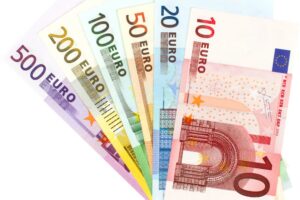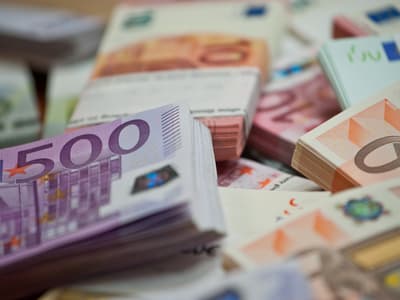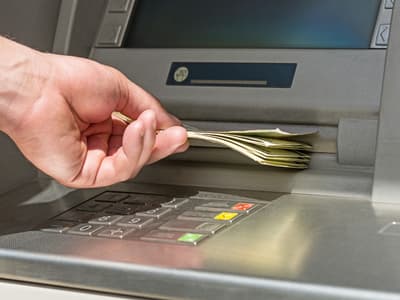In this article, we will explore everything you need to know about German currency, the different types of currency used, and more. So let’s get started!
German currency
Germany, a country known for its rich history and culture, also has a fascinating history regarding its currency.
The Euro, the current currency in circulation, has only been in use since 2002, but Germany has had several different currencies throughout its history.
From the Deutsche Mark to the Euro, understanding the evolution of the German currency can give us a deeper understanding of the country’s economic developments.
In this article, we will explore the history of German currency, the different types of currency used, and how to use it in day-to-day transactions.
We’ll also delve into the role of the German Central Bank and the impact of monetary policy on the economy.
Finally, we’ll look closely at the coins and notes in circulation, including their design, security features, and collectability.
Whether you’re planning a trip to Germany or simply curious about the country’s currency, this article will provide you with everything you need to know.
Types of German currency
Germany has had several different types of currency throughout its history. The most recent and current currency in circulation is the Euro, which has been used since 2002.
The Euro is the common currency used by 19 of the 27 European Union member countries and is divided into 100 cents. In Germany, the Euro is available in the following denominations: coins: 1, 2, 5, 10, 20, and 50 cents, as well as 1 and 2 Euro coins.
Banknotes: 5, 10, 20, 50, 100, 200, and 500 Euros. The exchange rate of the Euro can fluctuate based on a variety of factors, including economic conditions, political developments, and supply and demand.
Before the Euro, Germany used the Deutsche Mark (DM) as its currency. The Deutsche Mark was introduced in 1948 as a replacement for the Reichsmark and was used until the Euro’s introduction in 2002.
The Deutsche Mark was divided into 100 pfennige and was available in the following denominations: coins: 1, 2, 5, 10, and 50 pfennige, as well as 1 and 2 DM coins. Banknotes: 5, 10, 20, 50, 100, and 1000 DM.
In addition to the Euro and Deutsche Mark, Germany has used other currencies, such as the Reichsmark (1924-1948) and the Papiermark (1914-1923).
These currencies were used during specific historical periods, such as the Weimar Republic and the Third Reich, and were replaced by subsequent currencies due to political and economic changes.
Overall, the German currency has undergone several changes throughout its history. The Euro is the current and most widely used currency, but it is important to understand the evolution of the German currency and the historical context that led to these changes.
Using German currency
When it comes to using German currency, it is important to understand the acceptance of the Euro and how to access cash in Germany.
The Euro is widely accepted in Germany and is the official currency used in all transactions. You can use Euros at most retailers, restaurants, and other businesses.
However, some small, family-owned businesses or street vendors may only accept cash, so it is a good idea to have some cash on hand. Credit and debit cards are also widely accepted in Germany, making it easy to purchase without carrying large amounts of cash.
Accessing cash in Germany is relatively easy, thanks to the widespread availability of ATMs. ATMs, also known as Geldautomaten, can be found throughout the country and are a convenient way to withdraw cash in Euros.
Many ATMs also can withdraw cash in other currencies, but the exchange rate may need to be more favorable. Suppose you plan to travel outside of Germany.
In that case, informing your bank in advance is a good idea to avoid any issues with your card being blocked for security reasons.
Currency exchange is also available in Germany, and you can find currency exchange offices, banks, and some hotels that can provide this service.
However, it is important to remember that exchange rates and fees vary from place to place, so it is a good idea to shop for the best rate.
When tipping customs in Germany, it is customary to round up to the nearest whole Euro, or leave small change, when paying the bill in restaurants, cafes, and bars.
Tipping is not expected in all service industries, but it is appreciated in situations such as hairdressers, taxi drivers, and hotel staff.
Using German currency is relatively easy and convenient. The Euro is widely accepted, and cash can be easily obtained through ATMs and currency exchange.
Tipping customs are similar to other European countries, rounding up to the nearest whole Euro or leaving small change when paying the bill.
German central bank and monetary policy
The German Central Bank, also known as the Bundesbank, is responsible for implementing monetary policy in Germany and managing the country’s currency.
The Bundesbank was established in 1957 and is independent of the government, making decisions based on economic factors rather than political considerations.
The Bundesbank is a member of the European System of Central Banks (ESCB), which comprises the national central banks of all European Union member states that have adopted the Euro.
The ESCB is responsible for implementing monetary policy for the Eurozone, and the Bundesbank plays a significant role in this process.
Monetary policy manages an economy’s money supply and interest rates to achieve specific goals such as price stability, full employment, and economic growth.
The Bundesbank uses several tools to implement monetary policy, including open market operations involving buying or selling government bonds to influence the money supply and interest rates.
The German Central Bank and its monetary policy also impact the Eurozone. The European Central Bank (ECB) is responsible for monetary policy in the Eurozone and sets interest rates for the entire Eurozone.
As a member of the ESCB, the Bundesbank is represented on the ECB’s Governing Council, which sets monetary policy for the Eurozone.
In addition to implementing monetary policy, the Bundesbank is also responsible for maintaining the financial system’s stability and ensuring the smooth operation of payment systems.
The Bundesbank also issues and withdraws cash and is responsible for the security of the Euro.
The German Central Bank plays a crucial role in managing the country’s currency and implementing monetary policy. Its actions impact the German economy and the Eurozone as a whole.
The Bundesbank’s independence and its important role in the European Central Bank also allow it to contribute to the stability of the Euro and Eurozone economies.
German coins and notes
German coins and notes are important to the country’s currency system. The Euro, the current currency in circulation, is available in coin and note form.
The coins come in denominations of 1, 2, 5, 10, 20, and 50 cents, as well as 1 and 2 Euro coins. The banknotes come in denominations of 5, 10, 20, 50, 100, 200, and 500 Euros.
The German coins and notes design is similar to other Euro-zone countries, with the European map, the denomination, and the word “Euro” prominently displayed.
However, each country has a different national side designed by a national artist. German coins feature a portrait of German philosopher and poet Friedrich von Schiller, while the notes feature a portrait of German artist Albrecht Dürer.
Coins and notes also have several security features to prevent counterfeiting. Coins have a unique edge and a special mint mark, while notes have a holographic stripe, a watermark, and a security thread. These features make it easy to distinguish real currency from counterfeit.
German coins and notes are also subject to circulation figures, which means that older and less used notes and coins are removed from circulation and replaced with new ones. This helps to maintain the integrity of the currency and prevent counterfeiting.
In addition to their practical function, German coins and notes have a collectible aspect. The Bundesbank issues commemorative coins and notes for special occasions and events, such as the World Cup or the Olympic Games. These coins and notes are often highly sought after by collectors and can be valuable.
Overall, German coins and notes play an important role in the country’s currency system. They are designed with security features to prevent counterfeiting and are subject to circulation figures to maintain the currency’s integrity. They also have a collectible aspect, with commemorative coins and notes issued for special occasions and events.
Summary
German currency has a rich and fascinating history, from the Deutsche Mark to the Euro; each has its own story and context. Understanding the evolution of German currency can give us a deeper understanding of the country’s economic developments.
In this article, we have explored the history of German currency, the different types of currency used, and how to use it in day-to-day transactions.
We have also delved into the role of the German Central Bank and the impact of monetary policy on the economy. Finally, we have taken a closer look at the coins and notes in circulation, including their design, security features, and collectability.
It is important to note that while the Euro is the current and most widely used currency in Germany, it is also a common currency among 19 other EU countries, making it easy to travel and transact around the Eurozone.
The German Central Bank plays a crucial role in managing the country’s currency and implementing monetary policy, contributing to the stability of the Euro and Eurozone economies.
Whether you’re planning a trip to Germany or simply curious about the country’s currency, this article has provided you with a comprehensive overview of everything you need to know about German currency. The resources for further information provided in this article will be helpful for anyone who wants to learn more about the topic.


